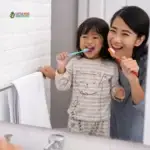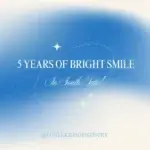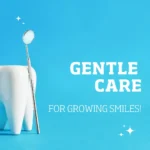A child losing baby teeth and gaining permanent ones usually doesn’t hurt, unlike when those first teeth grow. Most youngsters love this time after they get used to the idea of a tooth being wiggly and discover it doesn’t hurt when it falls out. After all, the Tooth Fairy is involved. It can be a different tale for the parents visiting our Little Kids Dentistry office. They frequently worry about the direction of eruption, whether their child’s loose tooth will fall out, or whether the new permanent teeth will look good. The staff at Little Kids Dentistry is breaking down all the information you need to know about your kid losing baby teeth to soothe your concerns.
WHEN DOES IT START?
The typical age at which a youngster loses their first tooth varies. It is reasonable for parents to worry when their young child doesn’t receive a visit from the Tooth Fairy, but their friends do. Almost all baby teeth charts state that children begin losing their baby teeth between the ages of six and seven. Although this is generally the case, some kids lose their baby teeth as early as age four, while others don’t start until they are seven or even eight. While it may not necessarily indicate a problem, it is best to consult your child’s pediatric dentist if their baby teeth appear to last longer than usual. Because the permanent tooth underneath it forces the baby tooth out as it begins to erupt, a baby tooth nearly always falls out. Though occasionally, harm, cavities, or other problems can cause a baby tooth to fall out without a permanent tooth to replace it. When this occurs, the other teeth often try to fill in the space, which can result in crowding. In these situations, we often use a space maintainer to keep space open for the adult tooth to erupt later.
CAN BABY TEETH EXPAND ON THEIR OWN? CAN I ASSIST THEM?
Baby teeth will typically lose on their own. Ask the youngster to gently wiggle the tooth with their tongue if it is loose and not coming out. It can often take a few months from when a tooth starts to wiggle until it eventually touches the road, as each tooth goes through a complex process where the root is broken down and absorbed. Therefore, since it might not be ready, we do not advise pulling it out or using the old dental floss trick on the door knob. Early tooth extraction can cause harm.
IN WHAT ORDER DO KIDS LOSE BABY TEETH?
It is one of the most frequent questions. The teeth often fall out in the same order that they emerge. American Dental Association offers an excellent timetable chart for the eruption of baby and permanent teeth. Usually, the bottom front teeth are the first to lose, then the top front teeth. Much like the baby teeth order, the rest tend to fall out symmetrically, meaning the tooth on one side will shed around the same time as its partner on the other side of the mouth. In most cases, bottom teeth erupt before corresponding teeth in the upper arch.
WHEN DO PERMANENT TEETH START TO GROW?
Around the age of six or seven, the first baby tooth—most likely one of the lower front teeth—should come out, and the next tooth should be a permanent one. If a baby tooth comes out and is not replaced by a permanent tooth within six months, speak to your child’s pediatric dentist. The tooth may just be taking its own time coming in, or it may result from a congenitally absent tooth. We’ll investigate and make sure your child’s smile development continues.
The first permanent molars also erupt between the ages of six and seven, which is why they are frequently referred to as the “six-year molars,” along with the replacement teeth.
Kids have “mixed dentition,” or a combination of primary and permanent teeth, from the moment they begin losing baby teeth until the last one is lost. The mixed dentition stage lasts until a child is 12 or 13 years old. Kids have all their adult teeth until the wisdom teeth at this age, after the permanent second molars erupt. If the wisdom teeth come in at all, it typically happens between the ages of 17 and 21.
Since permanent teeth need to last a lifetime and no backups are waiting in the wings if they fall out, oral care becomes more critical than ever. Encourage your youngster to floss once daily, restrict eating, and clean their adult teeth twice daily. Keep up with routine dental exams and cleanings as well.
Remember that every child is different, and those first teeth often fall out when they’re ready. Visit Little Kids Dentistry if you have questions or worries about how your child’s smile is developing. We’ll collaborate with you to maintain the strength and health of your child’s teeth.










